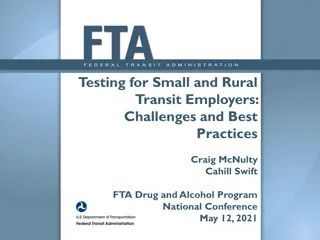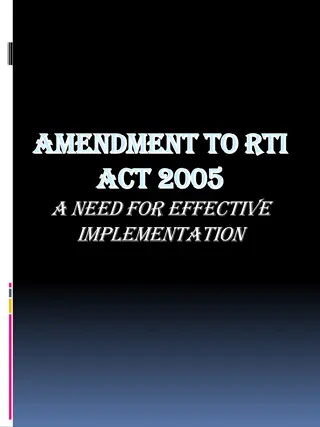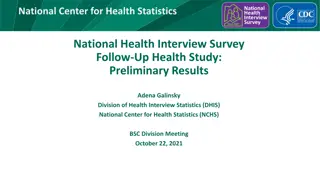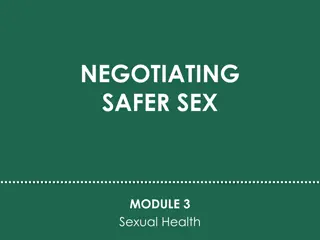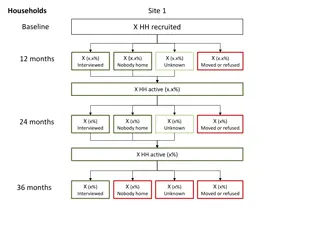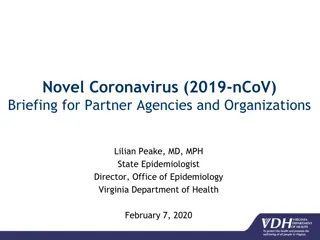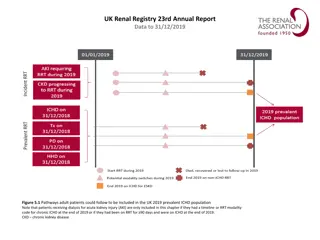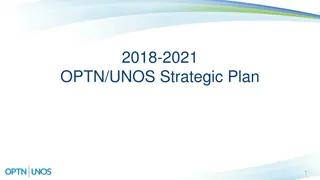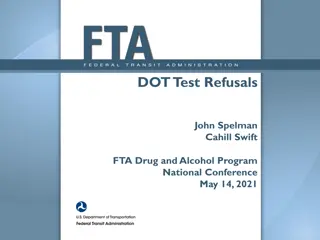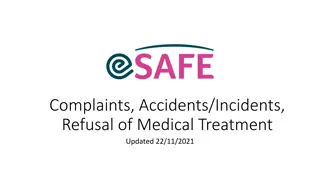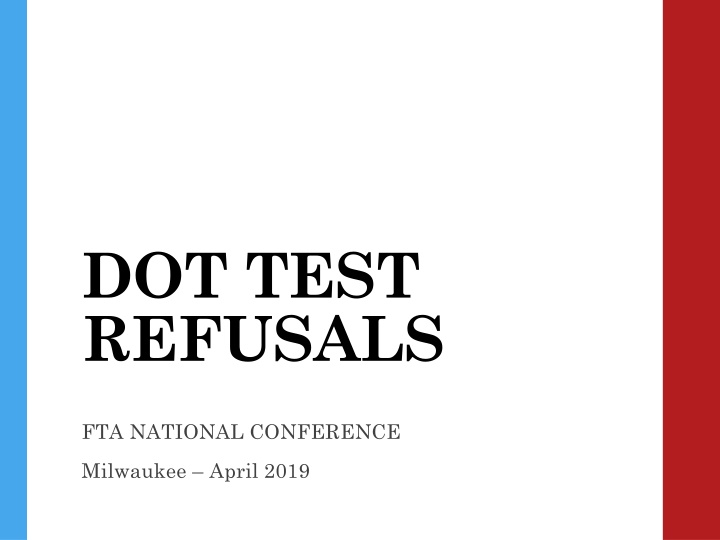
DOT Test Refusals and Regulations
Learn about DOT test refusals, how they impact safety-sensitive employees, and who can determine if a refusal has occurred. Explore the importance of handling refusals in compliance with Part 40 regulations.
Download Presentation

Please find below an Image/Link to download the presentation.
The content on the website is provided AS IS for your information and personal use only. It may not be sold, licensed, or shared on other websites without obtaining consent from the author. If you encounter any issues during the download, it is possible that the publisher has removed the file from their server.
You are allowed to download the files provided on this website for personal or commercial use, subject to the condition that they are used lawfully. All files are the property of their respective owners.
The content on the website is provided AS IS for your information and personal use only. It may not be sold, licensed, or shared on other websites without obtaining consent from the author.
E N D
Presentation Transcript
DOT TEST REFUSALS FTA NATIONAL CONFERENCE Milwaukee April 2019
Why it matters A refusal means that an individual refuses to participate in a required program component The regulations require that a refusal be treated in the same way as a positive A refusal disqualifies a safety-sensitive employee or applicant from performing covered functions* *Until deemed eligible per Part 40
Your Role Determine that a refusal DID occur Immediately remove the employee from safety-sensitive functions Refer them to the SAP
Who can determine if a refusals has occurred? The MRO? The DER? Evaluating Physician? A Supervisor? A Collector? A TPA?
Who can determine if a refusals has occurred? The MRO The DER The Evaluating Physician? FTA Drug and Alcohol REGULATION UPDATES Issue 55 August 2014
Refusals Determined DER/DAPM: You must make the final decision as to whether a refusal has occurred From the moment of notification to the completion of the collection, the DER must evaluate actions of the employee
Part 40: Drug Test Refusals Subpart I
Part 40: The Refusals The refusals listed in 49 CFR Part 40 cover the collection process Some refusals typically require more verification efforts than others These involve MORE people who are involved in the process Supervisor Collector/Technician or site staff Employee MRO Easier Involved
Refusals Listed Subpart I 49 CFR Part 40.191(a) (1) Fail to appear for any test (except a pre- employment test) within a reasonable time, as determined by the employer, consistent with applicable DOT agency regulations, after being directed to do so by the employer. This includes the failure of an employee (including an owner-operator) to appear for a test when called by a C/TPA (see 40.61(a)); Easier Involved
Refusals Listed Subpart I (2) Fail to remain at the testing site until the testing process is complete; Provided, That an employee who leaves the testing site before the testing process commences (see 40.63 (c)) for a pre-employment test is not deemed to have refused to test;
Refusals Listed Subpart I (3) Fail to provide a urine specimen for any drug test required by this part or DOT agency regulations; Provided, That an employee who does not provide a urine specimen because he or she has left the testing site before the testing process commences (see 40.63(c)) for a pre-employment test is not deemed to have refused to test;
Refusals Listed Subpart I (4) In the case of a directly observed or monitored collection in a drug test, fail to permit the observation or monitoring of your provision of a specimen (see 40.67(l) and 40.69(g));
Refusals Listed Subpart I (5) Fail to provide a sufficient amount of urine when directed, and it has been determined, through a required medical evaluation, that there was no adequate medical explanation for the failure (see 40.193(d)(2));
Refusals Listed Subpart I (6) Fail or decline to take an additional drug test the employer or collector has directed you to take (see, for instance, 40.197(b));
Refusals Listed Subpart I (7) Fail to undergo a medical examination or evaluation, as directed by the MRO as part of the verification process, or as directed by the DER under 40.193(d). In the case of a pre-employment drug test, the employee is deemed to have refused to test on this basis only if the pre-employment test is conducted following a contingent offer of employment. If there was no contingent offer of employment, the MRO will cancel the test;
Refusals Listed Subpart I (8) Fail to cooperate with any part of the testing process (e.g., refuse to empty pockets when directed by the collector, behave in a confrontational way that disrupts the collection process, fail to wash hands after being directed to do so by the collector). EXEMPTION: Donor refusing to initial bottle seals and/or completing Step 5 ***This refusal is a catch-all , and has the widest application.
Refusals Listed Subpart I (9) For an observed collection, fail to follow the observer s instructions to raise your clothing above the waist, lower clothing and underpants, and to turn around to permit the observer to determine if you have any type of prosthetic or other device that could be used to interfere with the collection process.
Refusals Listed Subpart I (10) Possess or wear a prosthetic or other device that could be used to interfere with the collection process.
Refusals Listed Subpart I (11) Admit to the collector or MRO that you adulterated or substituted the specimen.
Refusals Determined DER/DAPM: Refusals are possible at the moment of notification
Timeline Notification Proceeding to collection immediately Stopping current duties/tasks Proceeding to the collection (on/off-site) Arriving and signing in Participating in all aspects of the pre-collection Providing a specimen Completing the steps as instructed
Refusals Determined Supervisor, etc.: The individual notifying the employee of their requirement to test starts the process (different for pre-employment tests) Must be aware of the requirement to report prohibited behaviors May also be transporting employee
Refusals Determined Collectors: The collection site personnel must only describe the facts of what occurred You make the final determination
Practical Case Study Collector s Report: The employee entered the facility before their appointment, signed in. I called them back to begin the collection. When I told him empty his pockets, he did, but very slowly. I told him to wash his hands, he [said] ok, but really just rinsed them didn t scrub. When I handed him the cup, he went in and took almost all of the time I gave him.
Practical Case Study Collector s Report: The employee questioned every single step of the collection. I told her that I had showed the instructions and what would happen. I had to re- explain every single step as we went through it. By the time I told them to choose a cup, it had already taken 15 minutes. Contacted the DER and told her the employee was being obstructive and that I was busy and can t take the time to go through every little thing over and over and over. Told the DER that I felt the test would never actually happen.
Practical Case Study Collector s Report: The donor provided an insufficient specimen. I explained they would now enter the shy bladder process and they would have up to three hours and 40 ounces of water to provide another specimen. I provided them with a 10 ounce bottle of water and said I will check on them in 20 minutes. The donor stated they aren t going to drink any water and handed the water back.
Part 40: Alcohol Test Refusals Subpart N
Refusals Listed Subpart N 49 CFR Part 40.261(a) (1) Fail to appear for any test (except a pre- employment test) within a reasonable time, as determined by the employer, consistent with applicable DOT agency regulations, after being directed to do so by the employer. This includes the failure of an employee (including an owner-operator) to appear for a test when called by a C/TPA (see 40.241(a)); Easier Involved
Refusals Listed Subpart N (2) Fail to remain at the testing site until the testing process is complete; Provided, That an employee who leaves the testing site before the testing process commences (see 40.243(a)) for a pre-employment test is not deemed to have refused to test;
Refusals Listed Subpart N (3) Fail to provide an adequate amount of saliva or breath for any alcohol test required by this part or DOT agency regulations; Provided, That an employee who does not provide an adequate amount of breath or saliva because he or she has left the testing site before the testing process commences (see 40.243(a)) for a pre-employment test is not deemed to have refused to test;
Refusals Listed Subpart N (4) Fail to provide a sufficient breath specimen, and the physician has determined, through a required medical evaluation, that there was no adequate medical explanation for the failure (see 40.265(c));
Practical Case Study Collector s Report: The employee did not sign the consent or the intake forms that we require. We told him that he could not be tested [for alcohol] if he didn t. It was a refusal.
Refusals Listed Subpart N (5) Fail to undergo a medical examination or evaluation, as directed by the employer as part of the insufficient breath procedures outlined at 40.265(c);
Refusals Listed Subpart N (6) Fail to sign the certification at Step 2 of the ATF (see 40.241(g) and 40.251(d));
Refusals Listed Subpart N (7) Fail to cooperate with any part of the testing process. EXEMPTION: Donor refusing to complete Step 4 following a confirmation result of >.02 ***This refusal is a catch-all , and has the widest application.
Practical Case Study Supervisor s Report: On the way to the collection site [employee] told me that he was going to probably test positive. I said for drugs and he said yes.
The Reporting Process DAPM Collector MRO DAPM
Practical Case Study Supervisor s Report: When I took [employee] aside and notified them of their requirement for random [testing], she said she has to pick up her kids at 6pm and can t do the test. This was 4:50pm.
Part 40: Drug Test Refusals Other Sources
Refusals Listed Part 40.61 (4) If, as an employee, you normally void through self- catheterization, and decline to do so, this constitutes a refusal to test.
Refusals Listed Part 40.159 (c) If the employee admits to having adulterated or substituted the specimen, [the MRO] must, on the same day, write and sign your own statement of what the employee told you. You must then report a refusal to test in accordance with 40.163.
How to Report - Part 40.131 (a) When, as the MRO, you receive a confirmed positive, adulterated, substituted, or invalid test result from the laboratory, you must contact the employee directly (i.e., actually talk to the employee), on a confidential basis, to determine whether the employee wants to discuss the test result. In making this contact, you must explain to the employee that, if he or she declines to discuss the result, you will verify the test as positive or as a refusal to test because of adulteration or substitution, as applicable.
Refusals Listed Part 40.23 (b) As an employer who receives a verified adulterated or substituted drug test result, you must consider this a refusal to test and immediately remove the employee involved from performing safety-sensitive functions. You must take this action on receiving the initial report of the verified adulterated or substituted test result. Do not wait to receive the written report or the result of a split specimen test.
When there is no confirmed report (from MRO) Perform a preliminary review of the statements or documentation Determine that a refusal has occurred Remove the employee from safety-sensitive duties -Notifying employee comes after removal -Gather relevant statements, clarifications, etc. -Articulate to employee that refusal has occurred -Provide the employee with the names, addresses, and telephone numbers of substance abuse professionals
Discussing the Refusal with the Employee Describe the circumstances that lead to the decision Allow for additional facts from the employee during the conversation, but the burden of proof is on the employee Explain the consequences per company policy
The Pitfalls Confusion of DOT vs. Non-DOT Intake forms at the collection site Unclear account of interactions between collector and donor Well-meaning collectors giving bad instructions
Your Remedies Ask for MORE information Clarification of sequence of events IN WRITING! Quotes or summaries of conversations Match the actions with an actual citation If you can t match it to a citation, it isn t a DOT refusal
It matters A refusal means that an individual refuses to participate in a required program component The regulations require that a refusal be treated as a positive A refusal disqualifies a safety-sensitive employee or applicant from performing covered functions* *Until deemed eligible per Part 40
Additional Information FTA Drug and Alcohol REGULATION UPDATES FTA Letters of Interpretation FTA One-day Training Seminars

